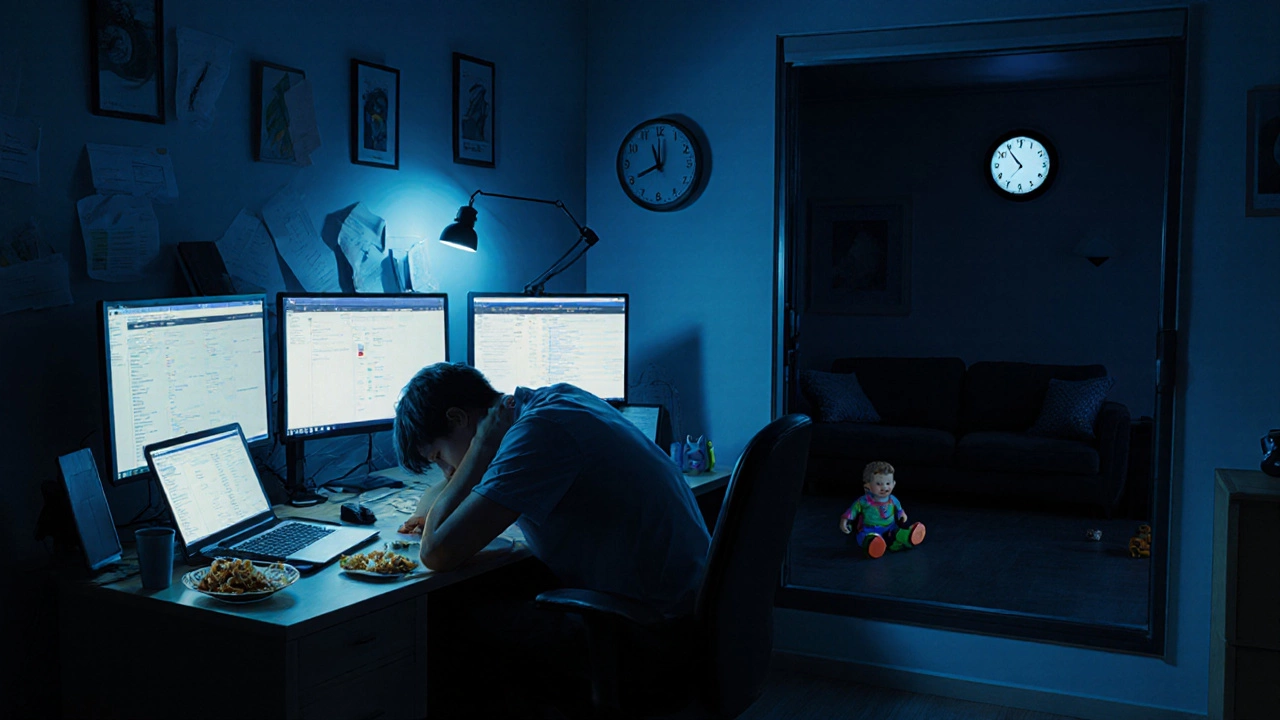Work-Life Balance Risk Calculator
How's your work-life balance?
Based on the 2025 global survey showing 58% of workers struggle with work-life balance, this tool helps you understand your personal risk level.
More than half of working adults today feel like they’re constantly running on empty. It’s not just you. In 2025, a global survey of 120,000 employees found that 58% of workers say they struggle to separate work from personal life. That’s more than 1 in every 2 people. And it’s not because they’re lazy or unmotivated - it’s because the lines between job and home have blurred beyond recognition.
Why Work-Life Balance Feels Impossible Right Now
The old 9-to-5 is gone. For many, work follows you home in the form of Slack messages at 10 p.m., Zoom calls during dinner, or emails sent on Sunday morning. A 2024 study by the World Health Organization found that people who work 55 or more hours a week have a 35% higher risk of stroke and a 17% higher risk of heart disease compared to those who work 35-40 hours. That’s not just fatigue - it’s a public health issue.
Remote work, which surged during the pandemic, was supposed to give people more freedom. Instead, it created a new kind of trap. Without a commute to mark the start and end of the day, work bleeds into every spare moment. People report checking emails while brushing their teeth, answering calls during their kid’s soccer game, or working through lunch because “there’s just too much to do.”
Who’s Most Affected?
It’s not evenly distributed. Women, especially those with young children, are 40% more likely to report poor work-life balance than men, according to data from the International Labour Organization. That’s not because they’re less capable - it’s because they still carry the bulk of caregiving responsibilities, even when they’re full-time professionals.
Young professionals under 30 are also hit hard. Many entered the workforce during the Great Resignation and now feel pressure to prove they’re “always on.” A 2025 survey of 15,000 Gen Z employees showed that 62% feel guilty for taking a full lunch break, and 47% say they’ve worked while sick just to keep up.
Even high earners aren’t safe. Corporate leaders and entrepreneurs often brag about working 80-hour weeks as a badge of honor. But burnout doesn’t care how much you make. A Harvard Business Review analysis found that executives who consistently work over 60 hours a week are 50% more likely to make major strategic errors - and 3x more likely to leave their jobs within two years.

What Does “Struggle” Actually Look Like?
It’s not always obvious. Some people don’t quit their jobs. They just stop enjoying them. They cancel plans with friends. They skip workouts. They forget to cook real meals. They lie awake at night replaying meetings in their head.
One nurse in Atlanta told a reporter she hadn’t taken a full weekend off in 14 months. She didn’t even notice until her daughter asked, “Mom, do you ever just sit and breathe?” That’s the quiet crisis: people don’t realize they’re drowning until someone points out they’ve forgotten how to float.
Physical symptoms are common too: headaches, stomach issues, insomnia, and chronic fatigue. Mental health clinics report a 70% spike in work-related anxiety since 2022. And it’s not just therapy bills - it’s lost productivity. The Global Workplace Analytics group estimates that poor work-life balance costs U.S. companies alone over $300 billion a year in absenteeism, turnover, and reduced performance.
It’s Not Just About Time - It’s About Control
People who have control over when and how they work are far less likely to feel overwhelmed. A 2023 study from Stanford found that employees who could choose their hours were 25% more productive and 40% less likely to report burnout than those on rigid schedules - even if they worked the same total hours.
That’s the real key: autonomy. It’s not about working less. It’s about working on your terms. A teacher in Texas started ending her workday at 5 p.m. sharp. She turned off notifications after hours and used weekends for hiking and reading. Her students noticed she was calmer. Her husband noticed she smiled more. She didn’t work fewer hours - she just stopped letting work dictate her life.

What Can You Do?
You don’t need to quit your job. You don’t need to move to a cabin in the woods. Small, consistent changes add up.
- Set a hard stop time for work each day - and stick to it. Use a timer if you have to.
- Turn off work apps on your phone after hours. If you can’t delete them, put them in a folder labeled “Work Only” and hide it on the second screen.
- Protect one day a week as truly off. No emails. No calls. No checking in.
- Start saying “no” to tasks that don’t align with your priorities. You’re not being unhelpful - you’re being human.
- Talk to your manager. Not to complain, but to propose a solution. “I want to be more productive. Can we try ending meetings at 4:30 on Fridays?”
Companies that let employees set boundaries see lower turnover, higher morale, and better results. Microsoft Japan tested a four-day workweek in 2024 and saw a 40% jump in productivity. Employees reported less stress, better sleep, and more time for family. They didn’t work less - they worked smarter.
It’s Not a Luxury - It’s a Necessity
Work-life balance isn’t about having more free time. It’s about having more life. The people who thrive aren’t the ones who do the most. They’re the ones who rest well, connect deeply, and show up fully - both at work and at home.
If you’re one of the 58% who feel stretched thin, know this: you’re not broken. The system is. But you can still reclaim your time. Start small. Be stubborn about your boundaries. And remember - your worth isn’t measured by how many hours you log. It’s measured by how alive you feel when you’re not working.
Is work-life balance only a problem for remote workers?
No. While remote workers often face unique challenges like blurred boundaries, office workers struggle too - just differently. Commutes, rigid schedules, and pressure to be seen at your desk can be just as draining. A 2025 Gallup poll found that 55% of hybrid workers and 52% of fully on-site workers reported poor work-life balance. The issue isn’t location - it’s control.
Can companies really fix work-life balance?
Yes - but only if they stop treating it as a perk and start treating it as a core value. Companies that succeed set clear expectations, respect off-hours, and reward results, not face time. Examples include Patagonia’s on-site childcare, Unilever’s flexible hours policy, and Basecamp’s 4-day summer weeks. These aren’t gimmicks - they’re sustainable practices that reduce burnout and boost loyalty.
Why do I feel guilty when I take time off?
You’ve been conditioned to believe that being busy equals being valuable. That’s a myth. Guilt often comes from workplace culture that rewards overwork and ignores rest. The more you see colleagues working late or answering emails on vacation, the more you feel like you should too. But guilt doesn’t mean you’re doing something wrong - it means the system is broken. Start small: take one lunch break without checking your phone. Notice how the world doesn’t end.
Is work-life balance possible in high-pressure jobs like medicine or law?
It’s harder, but not impossible. Many doctors and lawyers are now pushing back. Some hospitals have implemented mandatory time-off policies. Law firms are adopting “no-email weekends” for junior staff. The key is setting boundaries with clients and colleagues - and having leadership that supports it. One surgeon in Chicago started refusing non-emergency calls after 7 p.m. Her patients didn’t die. Her stress levels dropped. She’s been in practice 22 years - and she’s still here.
What if my boss expects me to be available 24/7?
Start by defining what’s truly urgent. Ask: “If this couldn’t wait until morning, would you have called me?” Then, set a clear, polite boundary: “I’m available for true emergencies between 8 a.m. and 6 p.m. Monday to Friday. For anything else, I’ll respond first thing the next day.” Most managers don’t actually want you awake at midnight - they just haven’t thought about the impact. You’re not being rude. You’re being professional.
